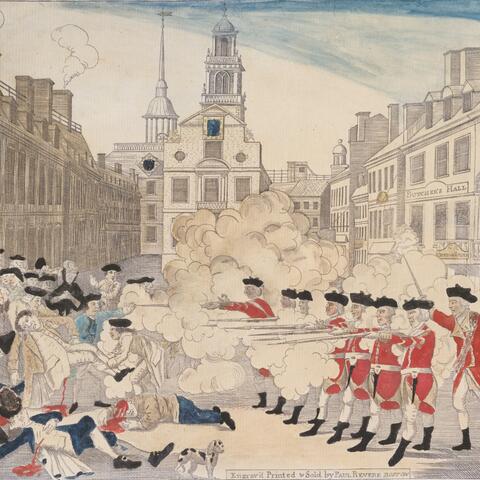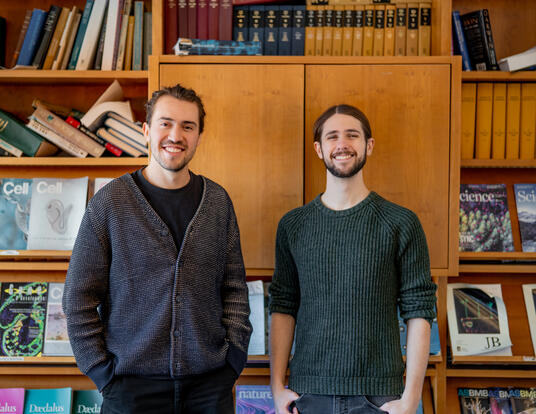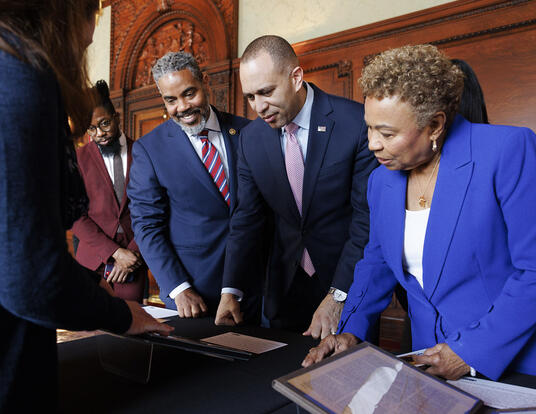Moving Motherhood beyond Bars
Gauging the impact of incarceration on parents—and their children
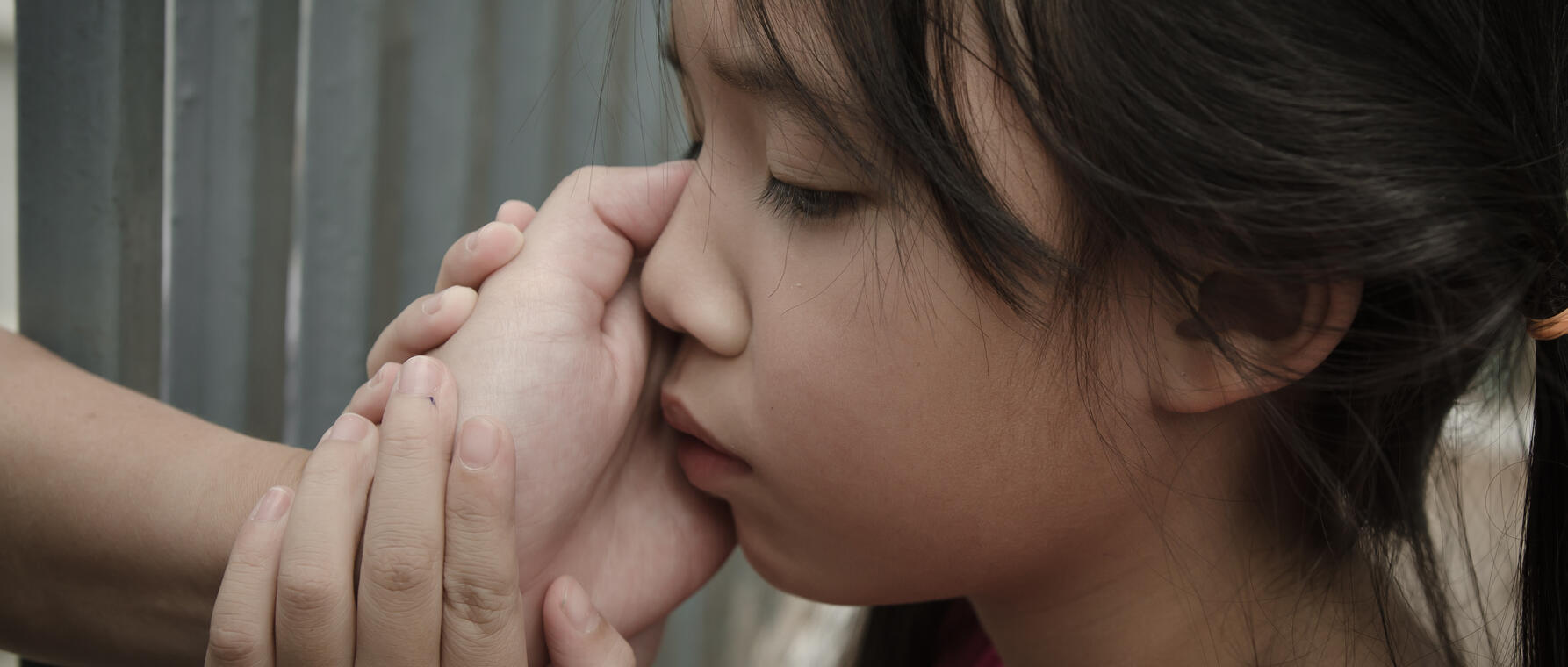
Research at Risk: Since World War II, universities have worked with the federal government to create an innovation ecosystem that has yielded life-changing progress. Now much of that work may be halted as funding is withdrawn. Find out more about the threats to medical, engineering, and scientific research, as well as how Harvard is fighting to preserve this work—and the University's core values.
Bethany Kotlar sat in a dormitory room in Georgia’s Lee Arrendale State Prison and listened to the stories of the women incarcerated there. The ones that broke her heart the most were those of the mothers who’d been pregnant during their sentence. They talked about being shackled when they were in labor and again just after they’d given birth, about being separated from their children, and about the lack of basic reproductive health care—even the sanitary napkins they needed during their monthly menstrual cycles.
“I was a divinity school student at Emory University in Atlanta and a chaplaincy intern at Lee Arrendale in 2012,” remembers the 2024 Harvard Horizons scholar. “After hearing the women’s stories, I went to the head chaplain at the prison and I said, ‘Hey, this is crazy. I would like to do something to help these moms. Can I start a program?’ Because the thing that kind of stood out to me was that the women had to do it all alone.”
Hundreds of incarcerated women no longer have to bear the burdens of parenting on their own thanks to Kotlar, a PhD student in population health sciences at the Harvard Kenneth C. Griffin Graduate School of Arts and Sciences, and Motherhood Beyond Bars (MBB), the nonprofit she founded over a decade ago. Kotlar's Harvard Horizons project, “When the Village Is Threatened: The Effects of Maternal Incarceration During Pregnancy and Early Childhood on Wellbeing,” provides badly needed research on a group that society mostly ignores and advances MBB’s effort to provide “comprehensive support for incarcerated mothers, their infants, and caregivers.”
Filling the Information Gap
Kotlar says there is a frustrating lack of the most basic information about incarcerated mothers and their children. “When I was at Lee Arrendale, there wasn’t even a reliable count of how many people were pregnant and in prison in the US,” she says. “We still don’t have great numbers.”
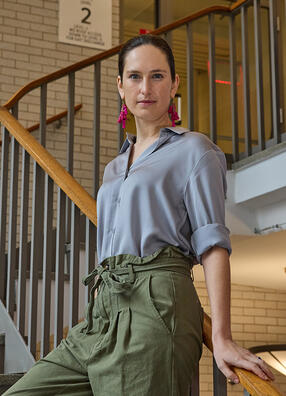
Perhaps not, but the numbers that are now available through MBB are staggering: a 525 percent increase in the number of incarcerated women—disproportionately people of color—over the past 4 decades; 80 percent of women held in jails are mothers to dependent children; in the state of Georgia alone, 200,000 children separated due to parental incarceration.
Kotlar’s PhD research digs into these figures, gathering data on “child development and family wellbeing in the context of mass incarceration.” Her work centers on children who were in utero during their mothers’ prison terms—and their caregivers. “Some moms are released before their kids are born, but most aren’t,” she explains. “So, the baby often goes home with a designated caregiver.” Kotlar’s study follows the children for the first three years of their lives.
“In the qualitative part of our work, we ask open-ended questions like, ‘How has it been going caring for this child?’ or ‘What was it like being pregnant and incarcerated?’” Kotlar explains. “Then, for the quantitative part, we have a survey with questions on a validated scale, including a depression or food insecurity screener. We do both at every time point so we can track the children’s development in a way that can be compared to other populations.”
Being pregnant and incarcerated meant my child was behind bars too. She suffered a lot of the same things I suffered: not being in control of our own medical care or our meals . . . I feel like she was punished in utero.
—Birth Beyond Bars participant
Primary caregivers of children with mothers in prison often struggle to hold a job and pay for childcare. Georgia provides subsidies, but Kotlar found that for a complex series of reasons, many caregivers weren’t getting the benefit. Now, thanks in part to her work, they do.
“What MBB was able to do with that information was to make sure caregivers of kids with an incarcerated mother automatically qualified for the Early Head Start program,” she says. “From there, those moms could get childcare.”
When Poverty Equals Neglect
Subsidies aside, the choice of a caregiver can be fraught for mothers, most of whom are imprisoned for offenses related to substance dependence rather than violent crimes. Some of Kotlar’s first PhD research looked at why the moms chose the caregivers they did and why the designees accepted the role. She found that the decision-making process is driven mostly by a deep-seated fear of the foster care system.
“The federal Adoption and Safe Families Act says that if your child is in foster care for 15 of 22 months, and if you're not following the plan set up by child welfare services, your parental rights can be terminated automatically,” Kotlar explains. “If you’re incarcerated with, say, a two-year sentence, it’s very difficult to jump through those hoops. These moms know that deeply.”
Because Kotlar has been working with incarcerated mothers for over a decade, she hasn’t been surprised by the results of her research. Still, some findings do stand out, particularly the way the child welfare system treats those with few financial resources. Kotlar says impoverished mothers run the risk of a foster care intervention.
“We haven’t been able to discern a consistent, logical reasoning for the process of removing a child from their parent’s care in Georgia,” she says. “What we do know is that 30 percent of the caregiving families in our study are below the federal poverty line. Many more struggle with food insecurity, with housing, with keeping the lights on and the water running. All of those things could be construed by Georgia child welfare services as neglect.”
In the next phase of her research, Kotlar plans to dive more deeply into the removal process and foster care system. “Only one child in our study entered foster care directly at birth,” she says. “But that child moved between families several times in their first year of life. We know that’s a critical period for establishing attachment to a caregiver and for social and emotional development, so that kind of movement data just set off alarm bells in my brain. The consequences are going to be bad for the child—and for the communities they live in.”
A Kind of Ministry
Kotlar planned to take a very different path after she graduated from college. She initially enrolled in the joint master of divinity/master of public health program at Emory University’s Candler School of Theology with her mind set on becoming a deacon in the United Methodist Church. A close relative had recently spent time in jail and horrified Kotlar with stories of the conditions there. When it was time to choose a site for her first-year practicum, Kotlar placed herself at Lee Arrendale, the largest women’s prison in Georgia. “When I heard the stories of women who had given birth during their incarceration I thought, ‘My God! How is this happening?’”
After she visited with the head chaplain, Kotlar started a post-partum support group, then prenatal yoga, then childbirth education classes. She recruited a raft of student volunteers from Emory’s schools of medicine, nursing, and public health to teach the groups and help write curricula. Faculty oversaw course development and contributed their expertise. In 2013, Kotlar consolidated the programs she’d developed and launched the statewide nonprofit Motherhood Beyond Bars.
“The name was chosen by incarcerated people to recognize that motherhood transcends the experience of imprisonment,” she says. “Today MBB is a thriving nonprofit with full-time staff, including an executive director, who manages day-to-day operations. We’ve expanded to provide re-entry and caregiver support. Ironically, it was the success of MBB that led me to a PhD.”
How women who are incarcerated are cared for during pregnancy and after giving birth will likely impact their own mental health and well-being as well as the development of their infants.
–Professor Aisha Yousafzai
Kotlar got her master’s degree in public health from Emory’s Rollins School in 2015. Three years ago, she launched Birth Beyond Bars (BBB), a research initiative that works hand in hand with MBB and is the focus of her PhD at Harvard Griffin GSAS. "It's a really close collaboration with the staff at MBB to answer important research questions about kids that have been exposed prenatally to incarceration," she says. "The data feeds back to the nonprofit to improve programming."
Monik C. Jimenez, an instructor at the Harvard T.H. Chan School of Public Health and who sits on Kotlar’s dissertation committee, says that the partnership with MBB both enriches the student’s research and extends its impact. “Through her research model, the community partner’s expertise is valued and contributes to each step in the process,” Jimenez says. “This approach then functions to first serve the community that is being engaged and the community partner and additionally expands our public health knowledge about the needs of incarcerated pregnant people, their children, and how to respectfully engage in community-based work.”
Another of Kotlar’s dissertation committee members, Harvard T.H. Chan School Professor Aisha Yousafzai, says Kotlar’s work is especially impactful because of its effects on two generations: the women who give birth and their children.
"How women who are incarcerated are cared for during pregnancy and after giving birth will likely impact their own mental health and wellbeing as well as the development of their infants," Yousafzai says, "for example, in the secure attachment between mother and infant and the social-emotional and behavioral development of the infant in the early years and beyond. The stability of nurturing care we receive influences a host of outcomes later in life including how well we do in school and the quality of our own relationships."
It’s been many years since Kotlar switched from divinity school to public health. (“I’m not sure how religious I am anymore,” she says.) Still, there is a thread that runs through Kotlar’s career, academic, and even spiritual paths: a passion for working with those who have been marginalized, forgotten, or cast aside.
“I’m still committed to the social justice part of religion,” she says. “It’s the moral imperative to do something about injustice. In that way, I guess you could say my work is a kind of ministry.”
This research was funded by the National Institute of Child Health and Human Development and the National Heart, Lung, and Blood Institute.
Learn more about the 2024 Harvard Horizons Scholars.
Get the Latest Updates
Join Our Newsletter
Subscribe to Colloquy Podcast
Simplecast


